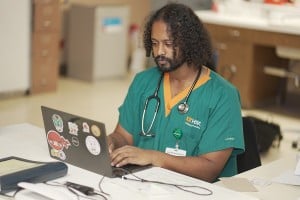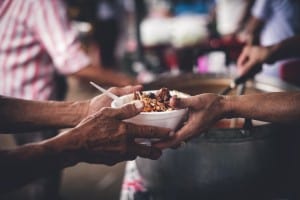In 2018, Adil Abdurahaman was rushed to the Elvis Presley Trauma Center with a traumatic brain injury following a car accident. His parents were told he might not survive.
Today, Adil is back at Regional One Health, this time doing his residency rotations for medical school at University of Tennessee Health Science Center.
Adil has devoted his life to giving back to others, and said he looks forward to treating patients with the same empathy and compassion he was shown.
Five years ago, Adil Abdurahaman spent over a month at Regional One Health after a serious car accident. Today, he spends his time at the hospital for a very different reason: completing rotations for medical school at University of Tennessee Health Science Center, where he expects to earn his medical degree in 2025.
“After my accident, my mom told me it’s a blessing that I’m even here. The doctors had told her they didn’t know if I’d live, or if I’d ever walk or talk again,” Adil said. “She told me, ‘You need to cherish life after something like this, because you really are blessed.’”
Adil took her words to heart and found meaning in his tragedy within Islam.
“After you experience something so life-changing, you realize every moment is a blessing. You realize you should use every moment to try to better yourself and better the world,” Adil said. “As long as I’m able to do that, I feel the blessing I received will be fulfilled with something I can be proud of.”
At the time of his accident, Adil was a sophomore biology major at University of Memphis. He recalls making himself dinner and leaving home, then, “The next thing I remember is waking up in the hospital with a ventilator and a trach. The doctor informed me I had suffered a traumatic brain injury. I was also told I had been in the hospital for about a month.”

Adil is currently doing his rotations for medical school and expects to graduate in 2025. He is considering a focus in internal medicine/pediatrics, which would allow him to care for the medical needs to seriously ill children and adults.
He had been rushed to Regional One Health’s Elvis Presley Trauma Center, the only level-1 trauma center in a 150-mile radius of Memphis. He spent weeks in a coma and needed extensive physical, occupational and speech therapy to regain basic skills like walking and talking.
While Adil remembers feeling frightened and alone, he also recalls being treated with humanity and skill. His doctors and nurses provided expertise and kept his family informed. His physical therapist provided not only encouragement and expertise, he took Adil’s mind off his problems by talking to him about videogames and telling terrible dad jokes.
Ultimately, Adil was able to return to school after missing just one semester. He did better than ever academically, and pushed himself to take as many classes as he could to graduate on time.
His mother’s words stayed with him. “To go from being in a coma to six months later going back to school and proving to myself I could still do well, I felt extremely blessed,” he said. “When you’ve been blessed, it’s your duty to seek out those in need.”
Adil has done so as a son, a volunteer, and a medical student.
“When I left the hospital, I wanted to do more to help my family,” he said. “My mom has been cooking her whole life. She’s a wonderful cook, but I wanted to take that burden off of her, so I started doing the cooking.”
He found a passion for making dishes traditional to his Ethiopian heritage, such as tibs, a mix of sauteed meat, onion, tomato, jalapeno and spices.

Adil also gives back through Feed the City, an initiative he and a friend developed to provide nutritious, delicious meals for people in need.
He put his cooking skills to work on a larger scale after getting involved with 901 Ummah, a nonprofit that connects young Muslims for service, mentorship, socializing and more. As community service chair, he worked with a friend to spearhead Feed the City, which shares nutritious, delicious food with people who need it most.
“We wanted to feed people with what we’d want ourselves, and at the same time give them an idea of different cultures, cuisines, spices,’” Adil said. “It’s been an amazing experience. We’ve fed thousands of people over three-and-a-half years.
Now, Adil is pouring his energy into another huge undertaking: earning his medical degree. He is in his third year at UTHSC and is considering specializing in internal medicine/pediatrics, which would allow him to care for the medical needs of children and adults with severe illnesses.
“Taking care of people in the most difficult times of their life is very fulfilling,” he said, noting he understands what patients are going through and aims to treat each patient with compassion. “It fuels my ambition to be a caring physician. Having gone through a difficult experience, I’m able to empathize.”
As he turns that experience into something that benefits others, he’s grateful for the role Regional One Health has played in his life as both a patient and future medical professional.
“God made it possible for me to be here, and he did it through Regional One Health and the knowledge and care of the doctors and nurses who cared for me and consoled my family,” Adil said. “I want other people to benefit from the blessing they gave me.”